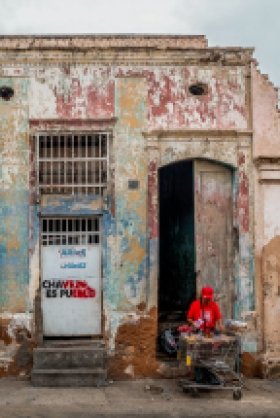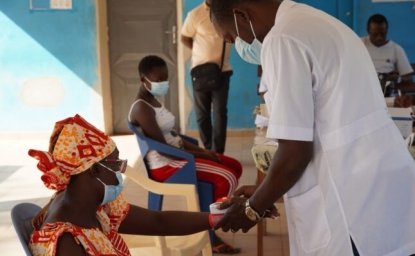A Crisis Within a Crisis: Venezuela and COVID-19


In a new report from the Latin American Program, Oriana Van Praag, with Cynthia J. Arnson, detail Venezuela’s calamitous humanitarian crisis that predates and is aggravated by the coronavirus, as well as the international response to the pandemic.
With failing public services, widespread scarcity of medical supplies, and rampant hunger and malnutrition before the pandemic, Venezuela is ill equipped to cope with COVID-19. The government headed by Nicolás Maduro has spent years denying the existence of a humanitarian crisis and resisting efforts to bring aid into the country. Now that the twin blows of the pandemic and the collapse in oil prices have left it without resources, it has looked abroad for humanitarian assistance while continuing to restrict and control aid deliveries. The government has mainly sought the help of its political allies—China, Russia, and Cuba—but has also asked the United Nations for assistance. The government’s request to the UN gives it a unique opportunity to open up space for Venezuelan civil society organizations, who are demanding guarantees for healthcare and humanitarian workers as well as a humanitarian accord to facilitate aid deliveries.
The report also calls attention to the plight of some 5 million Venezuelans who have fled the country, some 4.2 million of whom remain in Latin American and the Caribbean countries; the majority of migrants and refugees are informal workers and have lost their source of income due to quarantines. More than 62,000 Venezuelans have left Chile, Peru, Ecuador, and Colombia to return to their shattered homeland; and the number is likely to keep rising in coming months.
The authors note that on May 26, 60 countries pledged $2.79 billion to help Venezuelan refugees in the region. Until now, the main donor to the Regional Refugee and Migrant Response Plan has been the U.S. government. The authors conclude that increasing funding for refugee responses is fundamental but not sufficient, and that governments should strive to integrate Venezuelan migrants and refugees into their national responses, as Colombia is attempting to do.
Authors



Latin America Program
The Wilson Center’s prestigious Latin America Program provides non-partisan expertise to a broad community of decision makers in the United States and Latin America on critical policy issues facing the Hemisphere. The Program provides insightful and actionable research for policymakers, private sector leaders, journalists, and public intellectuals in the United States and Latin America. To bridge the gap between scholarship and policy action, it fosters new inquiry, sponsors high-level public and private meetings among multiple stakeholders, and explores policy options to improve outcomes for citizens throughout the Americas. Drawing on the Wilson Center’s strength as the nation’s key non-partisan policy forum, the Program serves as a trusted source of analysis and a vital point of contact between the worlds of scholarship and action. Read more

Explore More
Browse Insights & Analysis
Russia’s Security Approach to Public Health

WIPO is AWOL

